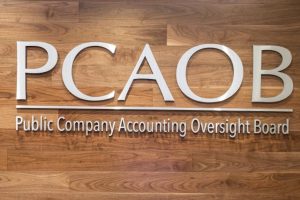
Audit firm watchdog, the Public Company Accounting Oversight Board (PCAOB), is seeking public comment on a proposal aimed at increasing auditor vigilance against fraud and other forms of noncompliance with laws and regulations.
If adopted, the proposal would strengthen auditor requirements to identify, evaluate, and communicate possible or actual wrongdoing and lawbreaking. According to current standards, outside audit firms, including the Big Four, have no obligation to be on the lookout for fraud. They are only required to assess the accuracy and reliability of public financial statements. The deadline for public comment on the proposal is Aug. 7.
“By catching and communicating noncompliance sooner, auditors can help companies course correct and better protect investors from risk,” said PCAOB Chair Erica Williams.
According to the PCAOB, the proposal seeks to strengthen and enhance auditor obligations related to a company’s noncompliance with laws and regulations through the following three key action steps:
Three New Requirements of PCAOB Proposal
Identify: The proposal would establish specific requirements for auditors to proactively identify – through inquiry and other procedures – noncompliance with laws and regulations applicable to the company that could have a material effect on financial statements. “The proposal also makes explicit that financial statement fraud is a type of noncompliance with laws and regulations,” the PCAOB said.
Evaluate: The proposal would strengthen requirements related to the auditor’s evaluation of whether noncompliance with laws and regulations has occurred, and if so, the possible effects on the financial statements and other aspects of the audit. “For example, the proposed standard would require the auditor to consider whether specialized skill or knowledge is needed to assist the auditor in evaluating information indicating noncompliance has or may have occurred,” the PCAOB said.
Communicate: The proposal would make clear that the auditor must communicate to the appropriate level of management and the audit committee “as soon as they are made aware that noncompliance with laws or regulations has or may have occurred.”
“Additionally, the proposal would create a new requirement that the auditor must communicate to management and the audit committee the results of the auditor’s evaluation of such information,” the PCAOB said. “Specifically, this communication would address which matters are likely noncompliance and the effect on the financial statements for those matters that are likely noncompliance.”
According to the PCAOB, by requiring auditors to identify and communicate noncompliance sooner, the amendments, if adopted, would encourage companies to remediate actions faster and thereby reduce investor harm caused by legal and regulatory penalties. Another potential benefit, the PCAOB said, would be lowering the likelihood of financial statements being materially misstated due to noncompliance with laws and regulations. ![]()
Jaclyn Jaeger is a contributing editor at Internal Audit 360° and a freelance business writer based in Manchester, New Hampshire.

